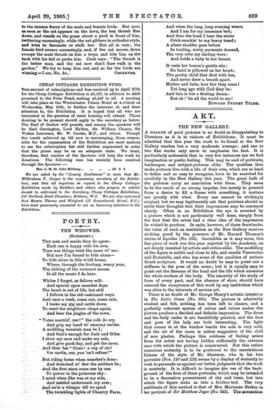THE WIDOWER.
THE men and maids they do agree :
Each one is happy with his own.
Time was things went the zame wi' me :
But now I'rn bound to bide alone—
To bide alone in this w'old house, Where, through the livelong, weary year, The chiking of the wainscot mouse
Is all the music-I do hear.
Whiles I forget, as fellows will: And spacial upon mearket days. The heart is out of life, but still I follows in the old-vashioned ways. And once a week, come zun, come rain, I teake my gig and rattle down To meet the neighbour chaps again, And hear the jingles of the town.
" Vaine marnins, zur !" the yolk do cry, And grip my hand wi' smarmy smiles.
A middling warmish man be I; And that's enough for Jack and Giles.
I show my earn and make my sale, And give good-day, and get the news.
And then 'tea "Come! a cup of ale! Vor zartin, znr, you 'on't refuse!"
But riding home when mearket's done : And drenched wi' dew the midden lie; And the first stars come one by one To quiver in the primrose sky : I mind. when She was at my side, And nestled underneath my arm ; And ne'er a whisper till we spied The twinkling lights of Chantry Farm. And I am for my lonesome bed; And droo the hush I hear the stairs Crick-crackin' to my heavy tread ; A silent shedder goes before In trailing, misty garments dressed, The very robe my darling wore : And holds a baby to her breast.
It veels her bosom's gentle stir :
Its head is pillowed on her heart: The pratty child that died with her, And never drew a breath apart.
Mother and babe, how fair they seem!
Yet long ago with God they be ;
And this is but a fleeting dream: But oh ! 'tis all the world to me !
EDWARD SYDNEY TYLER.


















































 Previous page
Previous page